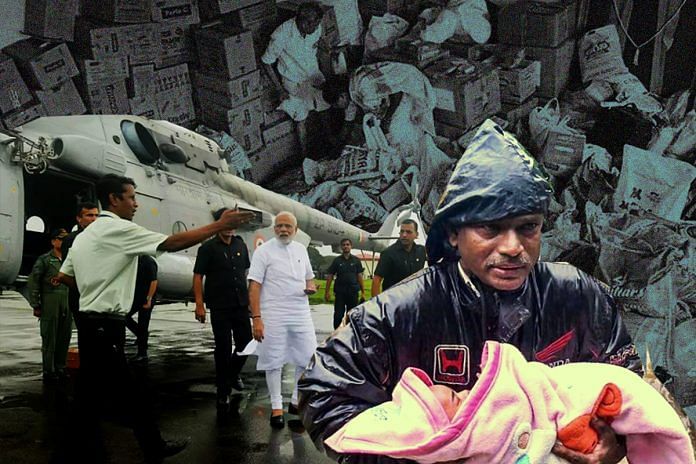India is likely to refuse relief aid from foreign countries like the UAE, Maldives, and Qatar for the devastating Kerala floods. The Centre wants to tap into its own resources first.
The same policy was followed by the previous UPA government during other national disasters.
ThePrint asks – Is India self-reliant or too proud in refusing Rs 700-cr aid for Kerala from UAE?
India has taken an unfortunate stand by refusing UAE aid
 Thomas Isaac
Thomas Isaac
Minister of finance, Kerala
This is an unfortunate stand that the Centre has taken. India need not have this kind of an attitude. The central government has its limitations and can say it can offer only Rs 500 crore, but then why should it prevent other countries from helping? Malayalees are living in these countries and contributing to their economies.
Other nations and groups, including even football teams, are coming forward to support Kerala. Everyone has been trying to help. The secular position that Kerala has upheld has been praised.
This has been one of the worst floods in the history of Kerala. The destruction has been widespread and many people have been dislocated. We have successfully completed the process of relocating people, with minimal deaths despite the bad flooding. Now we have 1.25 million people in the relief camps. The whole challenge is to get the camps to function properly and another week from now, people will start going back to their houses.
We will have to come up with a programme to reconstruct houses in the worst-affected areas. It is a difficult time and we need money for this. We estimate that the losses due to the floods have been close to Rs 20,000 crore.
Also read: Superstition about Kerala floods: Rule of faith or lack of rationalism in 21st century India?
UAE is offering help with no strings attached, shouldn’t affect our principles
 Oommen Chandy
Oommen Chandy
Former chief minister, Kerala
I cannot agree with the view that the Centre does not want to take financial help from other countries. I am writing to the Prime Minister stating that Kerala has not got sufficient funds. The current government has assessed the losses at Rs 20,000 crore and the figure is absolutely wrong. I have travelled across the state and seen the extent of damage. The losses are close to Rs 1 lakh crore.
Lakhs of people have lost their houses and we will have to rebuild those. The contribution from the UAE reflects the cordial relations between Kerala and Dubai. The UAE has always praised Keralites for their role in building their country. And, there is nothing wrong with the country helping Kerala.
The government should examine the issue. The financial aid is being offered with no strings attached. They are extending a helping hand to Kerala without any compulsion or condition, and in no way would it affect our principles.
In Kerala, lakhs and lakhs of people are suffering and countries like the UAE are extending help on humanitarian ground. We need all kinds of help from other states and governments for rescue and rehabilitation. This is not wasteful expenditure, and instead will help in rebuilding lives. The Centre should understand the nature and circumstances of the help offered.
What the Centre is doing is cruel. Are we not living in a federal system?
 Dr. K.G. Thara
Dr. K.G. Thara
Former head,
Kerala State Disaster Management Cell
It is atrocious that the central government should deny such international assistance because the Disaster Management Act and Policy, 2016 says that we cannot seek help, but if international agencies offer help, then we can accept it.
The dimension of the disaster that we are seeing in Kerala is far beyond what one can imagine. Kerala will find it very difficult to tide over it even with national and international help. We have taken international help earlier for issues such as water and sanitation, water pollution, telecommunications, relief materials and mobile medicare units to rural areas.
Right now what is important is the cleaning of houses, ensuring there is no breakout of an epidemic and helping people restart their normal lives. We have a huge task before us. We can even seek help from International agencies such as WHO and the UNICEF have said they will help.
What the central government is doing is very cruel. Are we not living in a federal system?
I don’t think this is a question of self-reliance, the move I suspect is politically motivated. It will be foolishness if we don’t rise above political differences and partisan views. I have no political leaning, I am a scientist, but I am shocked by the central government’s behaviour.
Also read: Sharing WhatsApp photo to ferrying people and food: How ‘God’s own army’ saved Kerala
India may want to try a ‘rarest of rare’ clause when it comes to foreign aid
 Rama Lakshmi
Rama Lakshmi
Editor, Opinion, ThePrint
Every natural disaster is followed by a second disaster that is fully man-made. The second one exposes the utter lack of preparedness and the debilitating inefficiencies in the state machinery.
Foreign aid was offered in some of the natural disasters that I have covered – the 1993 Latur earthquake, the 2004 Indian Ocean earthquake and tsunami and the 2015 Nepal earthquake. In Latur and Nepal, foreign aid was accepted. During the tsunami, former Prime Minister Manmohan Singh declined aid – a policy India has maintained for more than a decade now. It was a combination of national pride and concerns about allowing foreign groups in the strategically significant areas of the Andaman and Nicobar islands. Other countries affected by the tsunami that year accepted foreign help.
Foreign aid in disaster relief works best when there is a local capacity to absorb it. Often, there is poor and delayed communication of what is needed. There are not enough local agencies that can work with foreign groups efficiently or transport and distribute the supplies. Foreign language-speaking relief and rescue workers and doctors wait endlessly for local chaperones and guidance. In Latur, thousands of instant-noodle cups and foreign women’s clothing landed in remote Maharashtrian villages – something that the local people could not use easily and immediately. In Nepal, there were huge stockpiles of foreign relief tents at the Kathmandu airport languishing for days – even as local relief workers in the city kept saying they needed more tents.
It took several days for Nepal to set up a coordinating agency to use the foreign help.
But not all countries and situations can afford to have a blanket ban on foreign help. India may want to try a ‘rarest of rare’ clause for this.
Compiled by Rohini Swamy, associate editor at ThePrint.







India doesn’t need any external aid. So center should give 20,000 cr immediately and shut all critics mouths.
If they cannot, then put tail between your legs and accept the aid.
This stand was taken by previous congress government that no foreign aid should be taken. Why these leaders including congress were silent at that time. India really doesn’t need external aid. Some journalist and politician have to criticize both ways. These people have no credibility
It is really absurd to refuse aid from other countries. The policy of turning down aid from other countries was started by the UPA government in 2004 and India continues it. This policy is absurd, because humanitarian aid involves kindness. Refusing it amounts to cruelty. When we Indians say “Vasudhaiva Kutumbakam”, we must accept the good behavior of other countries. Why is India being arrogant? Does India want to show off that “it is great”?